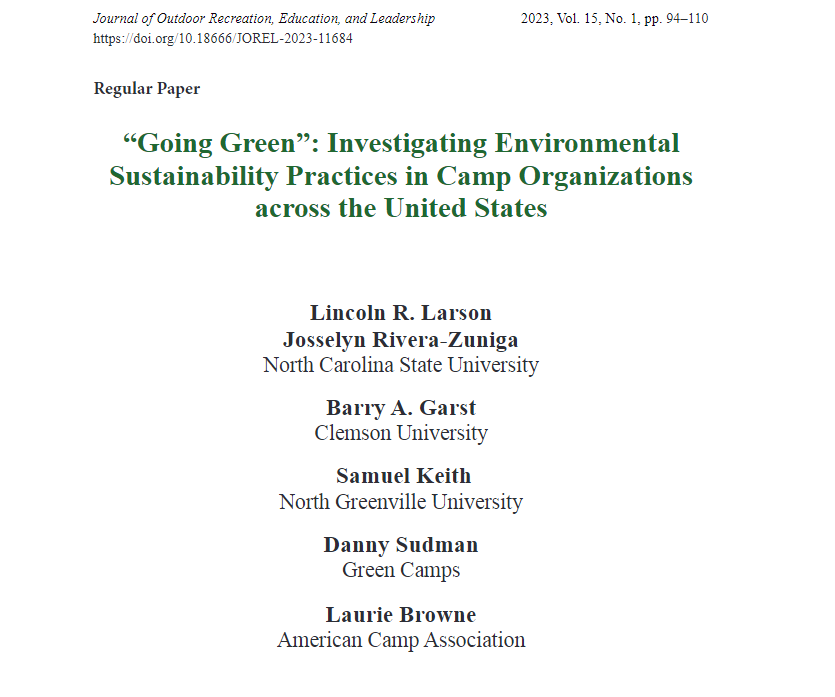Research Publication: The Journal of Outdoor Recreation, Education and Leadership

Abstract:
Our study explored current environmental sustainability practices of U.S. camps as well as the motivations and barriers influencing integration of sustainable operational approaches. Using a web survey of camp organizations in Spring 2021, we identified participation in sustainable actions across five broad categories: waste management, sustainability education and communication, natural resource and wildlife conservation, energy and water consumption, and purchasing and procurement. Many camp organizations already engaged in sustainable practices—especially with respect to waste management and sustainability education—but almost all camps wanted to do more. Camp organizations placed higher priority on environmental and social motivations for sustainability than economic reasons. The largest perceived barrier to sustainability was inadequate financial and/or technological resources, though lack of awareness and capacity-building assistance were also constraints. Results highlight strong interest in sustainability across the camp industry and reveal multiple ways to realize that potential.
Read Full Article: https://js.sagamorepub.com/jorel/article/view/11684/8514
Research Webinar: The Barriers and Motivators to Camp Sustainability
Webinar Recording: 2/24/2022
Research Presentation
Green Camps Education Presentation
Young people are longing for urgent and effective solutions to the environmental crisis. What better place to model and mentor sustainable solutions than camp, where thousands of children around the world experience the world in new ways every year? For many, the vision of a “sustainable camp” may seem out of reach. But while improving sustainability may be challenging, anything worthwhile is going to require intentionality and investment.
It’s clear that the camp industry stands to gain from the educational, economic, and environmental benefits of sustainability. So why aren’t more camps doing more to make it more of a priority? What are the barriers holding them back? What factors would motivate camps to take green action? What challenges and successes have other camps experienced? What resources are out there to teach camp staff the skills and knowledge to start or build upon your sustainability efforts?
Asking questions like these helps grow the conversation around the role the camp community can play in modeling sustainability for future generations. Answers to these questions might also help your camp save money while engaging and empowering your campers and reduce the environmental footprint of our industry.
In order to support the growth of this conversation, the American Camp Association has partnered with a faculty-led student research team at North Carolina State University to conduct a sustainable “needs assessment” for camps across the United States and beyond. This research is designed to address two primary objectives.
- Document sustainable practices camps are already engaged in across five different domains (education and communication, natural resources and habitat, purchasing and procurement, waste management, and energy and water consumption) and identify aspects of sustainability that could be improved or expanded
- Characterize motivations and barriers camps face in their efforts to become more sustainable and identify resources needed to help camps achieve this goal
The environmental science students involved in this research have a wide range of interests and backgrounds, including renewable resources, toxicology, marine science, urban ecology, sustainable materials, and environmental law and policy. Their faculty mentors, Dr. Lincoln Larson at NCSU and Dr. Barry Garst at Clemson, have both worked in the outdoor recreation research world for years and are guiding the students as they develop, administer and analyze the survey.
Show your support for sustainable development in the camp community by sharing this important with other camp and sustainability professionals on social media @gogreencamps #gogreencamps
